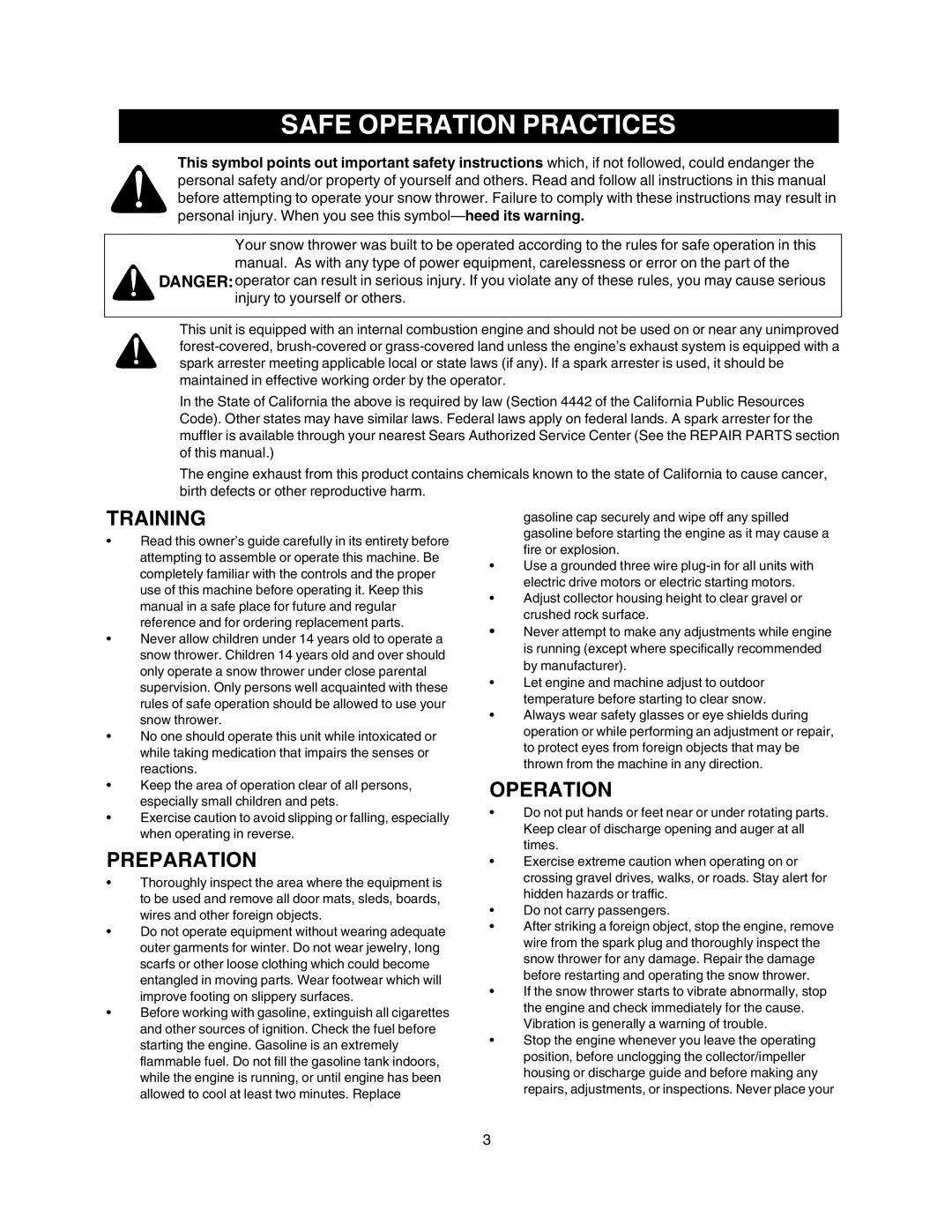
SAFE OPERATION PRACTICES
This symbol points out important safety instructions which, if not followed, could endanger the personal safety and/or property of yourself and others. Read and follow all instructions in this manual before attempting to operate your snow thrower. Failure to comply with these instructions may result in personal injury. When you see this
Your snow thrower was built to be operated according to the rules for safe operation in this manual. As with any type of power equipment, carelessness or error on the part of the
DANGER:operator can result in serious injury. If you violate any of these rules, you may cause serious injury to yourself or others.
This unit is equipped with an internal combustion engine and should not be used on or near any unimproved
In the State of California the above is required by law (Section 4442 of the California Public Resources Code). Other states may have similar laws. Federal laws apply on federal lands. A spark arrester for the muffler is available through your nearest Sears Authorized Service Center (See the REPAIR PARTS section of this manual.)
The engine exhaust from this product contains chemicals known to the state of California to cause cancer, birth defects or other reproductive harm.
TRAINING
•Read this owner’s guide carefully in its entirety before attempting to assemble or operate this machine. Be completely familiar with the controls and the proper use of this machine before operating it. Keep this manual in a safe place for future and regular reference and for ordering replacement parts.
•Never allow children under 14 years old to operate a snow thrower. Children 14 years old and over should only operate a snow thrower under close parental supervision. Only persons well acquainted with these rules of safe operation should be allowed to use your snow thrower.
•No one should operate this unit while intoxicated or while taking medication that impairs the senses or reactions.
•Keep the area of operation clear of all persons, especially small children and pets.
•Exercise caution to avoid slipping or falling, especially when operating in reverse.
PREPARATION
•Thoroughly inspect the area where the equipment is to be used and remove all door mats, sleds, boards, wires and other foreign objects.
•Do not operate equipment without wearing adequate outer garments for winter. Do not wear jewelry, long scarfs or other loose clothing which could become entangled in moving parts. Wear footwear which will improve footing on slippery surfaces.
•Before working with gasoline, extinguish all cigarettes and other sources of ignition. Check the fuel before starting the engine. Gasoline is an extremely flammable fuel. Do not fill the gasoline tank indoors, while the engine is running, or until engine has been allowed to cool at least two minutes. Replace
gasoline cap securely and wipe off any spilled gasoline before starting the engine as it may cause a fire or explosion.
•Use a grounded three wire
•Adjust collector housing height to clear gravel or crushed rock surface.
•Never attempt to make any adjustments while engine is running (except where specifically recommended by manufacturer).
•Let engine and machine adjust to outdoor temperature before starting to clear snow.
•Always wear safety glasses or eye shields during operation or while performing an adjustment or repair, to protect eyes from foreign objects that may be thrown from the machine in any direction.
OPERATION
•Do not put hands or feet near or under rotating parts. Keep clear of discharge opening and auger at all times.
•Exercise extreme caution when operating on or crossing gravel drives, walks, or roads. Stay alert for hidden hazards or traffic.
•Do not carry passengers.
•After striking a foreign object, stop the engine, remove wire from the spark plug and thoroughly inspect the snow thrower for any damage. Repair the damage before restarting and operating the snow thrower.
•If the snow thrower starts to vibrate abnormally, stop the engine and check immediately for the cause. Vibration is generally a warning of trouble.
•Stop the engine whenever you leave the operating position, before unclogging the collector/impeller housing or discharge guide and before making any repairs, adjustments, or inspections. Never place your
3
